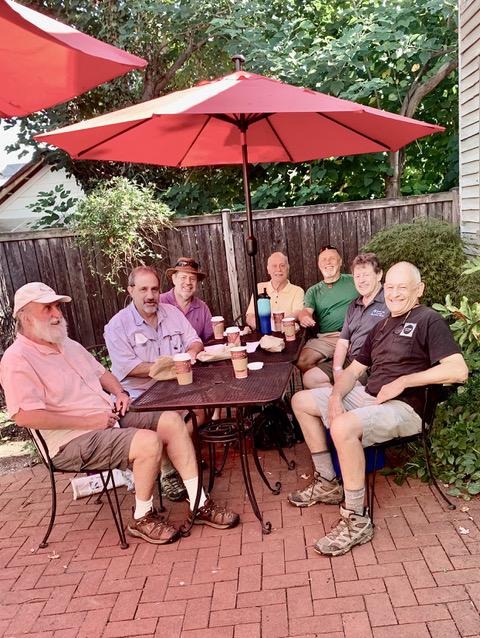I am part of a group of old farts (the “Coffee Klatch”) who meet once a week to shoot the breeze. But being old, the topic often turns to health and the conversation degenerates into something of an organ recital. Prostate, bowel, joint or kidney problems – almost any organ.

But the one that seems to get the most bandwidth is the heart – or more precisely, some rhythm abnormality and atrial fibrillation (AF) in particular.
My Klatch buddies seem to be a good illustration of the variations in severity - some unaware they were fibrillating, until, in one case, his blood pressure machine suggested it. Others passing out – one keeling over and breaking his nose - and finishing up in the ER.
Several tipped into AF by some co-morbidity. Three have been diagnosed as having sleep apnea as a precipitating cause – with marked improvement when treated. One experiencing what I’d heard referred to in England as “Holiday Heart Syndrome” where AF is precipitated by alcohol – so called because of the increased prevalence of AF around the holidays when everyone’s “holidaying” a little too hard.
The prevalence of AF has increased threefold in the last 50 years – which I can believe judging by the number of patients and friends afflicted. To find out more about this I called Fredericksburg cardiologist Dr. Daniel Carlson - who graciously and enthusiastically returned my call.
Sparks
To understand AF it is necessary to explain the electrics – to take you back to the days when I was a nerdy medical student at Guy’s Hospital, in London, and the petulant Professor Hunt in the physiology department was trying beat this stuff in to me and my fellow students.
To explain how the electrical impulse that stimulates the muscle of first the atria then the ventricles to contract, is generated in the heart’s pacemaker – the sino-atrial node.
How it descends through an elaborate “wiring” system - the atrio-ventricular node, the Bundle of His and the Purkinje fibers - to cause the heart to beat, and pump blood into the circulation.
The problem comes when either the indigenous pacemaker goes on the fritz, or some other part of the heart muscle tries to muscle in on the job, creating an ectopic pacemaker. This makes for an uncoordinated contraction of the atrium, so blood doesn’t flow efficiently into the ventricle. It also creates the danger of stagnating blood clotting, and then the clots being ejected into the circulation and blocking small blood vessels – which in some vulnerable location like the brain causes a stroke.
The increase in prevalence of AF, Carlson attributes to an extent to us being “in an era of data overload” – everyone has some app on their smart phone or an Apple watch to tip them off if they happen to fibrillate. But we have also done such a good job staving off coronary artery disease “with statins and other medicines and smoking cessation” that heart arrhythmias and heart failure are becoming more apparent.
Treatments range from using medicines like beta blockers to control the rate, to cardioversion (using an electrical charge to shock the heart back into normal rhythm), to ablation where you use a laser or cryo-probe, fed through a heart catheter, to destroy an aberrant pathway, to an implanted pacemaker that will provide a reliable stimulus to make the heart beat regularly.
Or sometimes a combo’ when aggressive treatment is needed notes Carlson. Hit them with the new idea of “pace and ablate.”
The danger of AF is very variable he notes “and depends very much on other risk factors.” A 45 year old man who is otherwise well is a very different situation to an 85 year old diabetic, hypertensive woman for example.
Sometimes an attack will resolve spontaneously – which can be embarrassing when you’ve taken yourself to the ER in a panic. But AF can cause heart failure from inefficient heart function. Most feared is stroke from blood clot embolizing, so most people are put on blood thinners.
Those less enthralled by allopathic, and more in to “natural” medicine lifestyle emphasized. Avoid stimulants, dehydration, gluten, and stress. Pay attention to nutrients and exercise advises Healathline.com.
I see very different responses to this diagnosis in my Klatch buddies. Some feeling “not too worried” protected by their beta-blockers and blood thinners, to others catastrophizing, feeling anxious and vulnerable. But given the – increasing – prevalence of AF, not to mention other kinds of heart arrhythmias, it’s a topic to keep the general public and cardiologists, on their toes.
One thought is of course, as caffeine is one of the stimulants that can precipitate AF, we maybe need to rename, or redirect our Coffee Klatch. But I can’t believe our conversations would be nearly as animated or thoughtful over a nice cup of herb tea or glass of water.
One concern is that some studies have shown caffeine is associated with cardiac arrhythmias, though not necessarily AF. But it may be that the excited discourse that the caffeinated Klatch members get into because of the coffee is over stimulating their hearts – but I can’t believe our conversations would be nearly as animated or thoughtful over a nice cup of herb tea or glass of water.
consumption is caffeine is one of the stimulants that can precipitate AF, we maybe need to rename, or redirect our Coffee Klatch. But I can’t believe our conversations would be nearly as animated or thoughtful over a nice cup of herb tea or glass of water.



